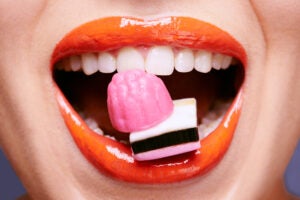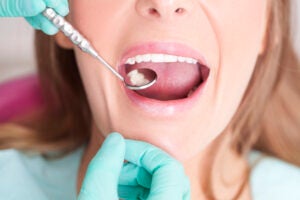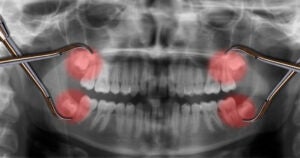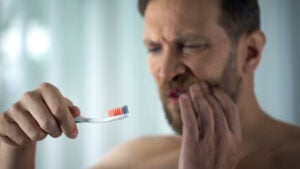-
8 Bad Habits That Ruin Your Dental Health

Are you looking for ways to take better care of your smile? It’s easy to focus on things you should do, like brush morning and night, floss once a day, and visit your dentist for a professional cleaning every six months. But what about the things you shouldn’t do? Here are eight bad dental health habits that you need to break right now.
- Chewing on ice or hard candy: Munching on the ice cubes at the bottom of your drink may seem harmless, but this habit can damage your teeth if you bite down wrong. Chill your beverage before serving it to avoid needing ice, or drink from a straw to reduce the temptation to chew.
- Biting your nails or chewing on pens: These bad habits introduce harmful germs into your mouth, damage your teeth, and lead to jaw dysfunction. If you want to stop biting your nails, try wearing bitter-tasting nail polish.
- Using your teeth as tools: Never use your teeth to open packages, undo knots, tear tape, or open bottles. Instead, find the right tool for the job, such as scissors or a bottle opener.
- Constantly snacking or sipping on sugary drinks: Eating nonstop keeps your teeth in constant contact with food particles, increasing the risk of cavities. This habit is even more problematic if your snacks or drinks have high sugar content. The solution is to eat balanced meals so you aren’t tempted to snack all day. Then, reach for water instead of juice, soda, or sports drinks.
- Brushing too hard: Aggressive brushing can wear down tooth enamel and irritate your gums. To avoid these problems, choose a soft-bristled toothbrush and focus on gently massaging your teeth, not scrubbing them raw.
- Playing contact sports without a mouthguard: It only takes one hit to the mouth to chip, break, or even lose a tooth. You might also bite your cheek or tongue. To protect your teeth and soft tissues, ask your dentist about creating a custom mouthguard.
- Grinding your teeth: Stress can cause nighttime tooth grinding, or bruxism, a habit you have little control over. If you think you grind your teeth in your sleep, the best solution is to wear a special nighttime mouthguard your dentist makes just for you.
- Smoking or chewing tobacco: Using tobacco products of any kind stains your teeth, causes gum disease, and increases the risk of oral cancer. Save your dental health—talk to your dentist for tips to quit smoking
At Park 56 Dental, we know it can be hard to break bad oral health habits. But just a few small changes can go a long way toward preserving your smile! For more tips or to schedule your next dentist visit, feel free to get in touch. We’ve been voted the best dentist in New York, with over 20 years of experience serving the 10022 zip code area. Call us at (212) 826-2322 or contact us online to speak with our NYC dentist today.
-
Why it’s Important to Replace a Lost Tooth

Many people assume that a missing tooth only has cosmetic consequences. But while having a gap in your smile is enough to make anyone self-conscious, there are also numerous health-related reasons not to ignore a missing tooth. Whether you opt for a bridge, removable partial dentures, or a dental implant, here’s a look at why it’s important to replace a lost tooth.
- Your teeth may shift and loosen: Every tooth helps maintain the stability of the one next to it. If you lose a permanent tooth, the surrounding teeth may begin shifting to fill the gap, undoing years of orthodontic work.
- Chewing may be more difficult: The sensitive gum tissue where your tooth is missing can make it painful to chew in that part of your mouth. Then, if your teeth drift out of place, your bite may suffer, making chewing even more uncomfortable. Over time, you may find it cumbersome to eat solid, healthy food like fruits and vegetables, which can lead to poor nutrition.
- You could develop TMJ disorder: To avoid discomfort, you may start chewing food on only one side of your mouth. However, this can strain your jaw muscles and lead to temporomandibular joint (TMJ) disorder, resulting in jaw pain, chronic headaches, and other symptoms. Lopsided chewing can also wear down your teeth unevenly and affect their appearance.
- You may be more prone to cavities and gum disease. A shifting smile and altered bite can make your teeth harder to clean. This means you’re more vulnerable to tooth decay and gum disease, both of which may lead to further tooth loss.
- Your jaw bone could deteriorate: A healthy jaw is only possible if you have healthy teeth to stimulate the production of new cells. If you lose one or more teeth, this stimulation disappears, which can lead to bone loss.
- Your appearance could change: When your opposing teeth have nothing to make contact with, your muscles and bone structure may begin to change. This problem is most apparent if you lose several teeth, which can lead to sunken cheeks and an aged appearance.
- Your self-esteem could suffer: Losing baby teeth may have been fun as a kid, but having a gap in your smile as an adult can drain your confidence level. First, you become concerned with your appearance and cover your mouth when you smile. Then, you may avoid talking too much if you develop a speech issue. Depression and anxiety can set in as a result.
If you recently lost a tooth in a traumatic incident or had a decayed tooth extracted, visit Park 56 Dental to explore your tooth-restoration options. We recommend dental implants to many of our patients because they provide a hassle-free, long-lasting way to replace a lost tooth. Even if you didn’t qualify for an implant in the past, you may now be eligible. To find out what makes us the best dentist in New York, please call us at (212) 826-2322 and schedule a consultation.
-
Why Do Dentists Encourage You to Have Your Wisdom Teeth Removed?

The human mouth goes through numerous changes over the years. For many people, one of the most memorable milestones is the appearance of the third molars around ages 17 to 21. “Wisdom teeth” are so named because they are the final teeth to appear and come in at a mature age.
When wisdom teeth erupt through the gums correctly, they can help with chewing. However, while there’s no definitive rule, most people have their wisdom teeth removed. Why is this? And how do you know if you should keep your wisdom teeth or not?
Many situations warrant having your wisdom teeth removed. Here are the most common reasons your dentist may encourage you to make this choice.
Fully Impacted Wisdom Teeth
An impacted tooth fails to erupt through the gums, meaning it remains covered by gum tissue. This may occur if your mouth is too small for the tooth to emerge. Dentists usually recommend removing impacted wisdom teeth because trapped bacteria could cause painful cysts or abscesses to form.
Partially Impacted Wisdom Teeth
A partially impacted tooth erupts partway through the gums. Dentists almost always advise removing wisdom teeth in situations like this. After all, the partial eruption makes it easy for bacteria to get inside, leading to swelling, pain, and stiffness in the jaw. Tooth decay is also more likely because it’s difficult to clean a partially impacted tooth.
Overcrowding
Some willful wisdom teeth erupt fully, even if there isn’t room in the jaw. This can overcrowd your mouth and damage neighboring teeth. Your entire smile may even shift, throwing off your bite and causing jaw pain.
Necessary for Your Dental Care Plan
Your dentist may recommend wisdom teeth extraction as part of your overall oral care plan. For instance, if you’re planning to get braces soon, it’s wise (pun intended) to remove problematic wisdom teeth before you begin straightening your smile. And if your wisdom teeth come in after having braces, prompt removal prevents them from undoing all your hard work.
Other Problems
If you decide to keep your wisdom teeth for now, continue to monitor them for signs of trouble. It may become necessary to remove them if issues develop near your wisdom teeth, such as:
- Tooth, jaw, or cheek pain
- Repeated infections
- Gum disease
- Extensive tooth decay
The decision to remove your wisdom teeth isn’t always straightforward. That’s why it’s important to visit the dentist regularly. Routine oral exams and X-rays reveal what’s happening in your mouth so you can take the best course of action for your oral health.
If your wisdom teeth are giving you trouble, visit Park 56 Dental for a consultation. We offer compassionate, high-quality dentistry in the 10022 zip code area of NYC, and we’re confident we can help you make the right choice regarding your wisdom teeth. If you decide to have them extracted, rest assured that we offer sedation dentistry to make you feel more comfortable. Call us at (212) 826-2322 to set an appointment today.
-
Why Your Gums Hurt When Brushing Your Teeth

Do your gums hurt when you brush and floss? Is there blood in your toothpaste when you spit into the sink? This usually means one of two things—either you’re being too rough when you brush and floss, or you’re developing gum disease. To rule out other more serious problems, be sure to visit your dentist. Otherwise, explore these solutions to help prevent your gums from hurting when you brush your teeth.
When Your Gums Hurt Because of Rough Brushing and Flossing
It’s easy to brush too hard when you’re trying to be thorough. However, you can easily irritate your sensitive gum tissue if you scrub aggressively. Here’s how to clean your teeth while protecting your gums:
- Use a soft-bristled toothbrush.
- Brush in gentle, circular motions.
- Consider switching to an electric toothbrush.
- When flossing, follow the curve of your teeth and avoid snapping the floss against your gums or using a sawing motion.
When Your Gums Hurt Because of Gum Disease
Mild gum disease, known as gingivitis, starts when a sticky film of bacteria called plaque builds up along the gum line. Ignoring gingivitis can lead to periodontal disease and, eventually, severe periodontitis. If your gums are swollen, red, irritated, and hurt when you brush, talk to your dentist about starting treatment.
Other Reasons Why Your Gums Hurt
There are many other potential causes of painful gums, including:
- Canker sores
- Tooth abscesses
- Tobacco use, including cigarettes, vaporizers, and chewing tobacco
- Hormonal changes during puberty, menstrual cycles, pregnancy, and menopause
- Thrush, a type of yeast infection
- Ill-fitting oral devices, including braces, retainers, dentures, and mouthguards
- Chemotherapy drugs
How to Sooth Sore Gums
In addition to brushing and flossing more gently, treating gum disease, and tackling other causes of painful gums at the source, try these tips to soothe your sore gums:
- Rinse your mouth with warm saltwater.
- Rinse with mouthwash containing hydrogen peroxide.
- Take over-the-counter pain relievers.
- Apply numbing gel to the tender area.
- Avoid spicy or acidic foods to avoid further irritation.
- Eat yogurt with live cultures to balance the bacteria in your mouth.
Discuss Your Symptoms with Your Dentist
If your gums hurt or bleed for over a week, and your attempts to treat the problem at home aren’t working, it’s time to contact your dentist. A professional teeth cleaning can remove the stubborn plaque irritating your gums. Your oral hygienist may also perform a deep-clean called root planing and scaling if you have gum disease.
Don’t ignore painful gums—stop by Park 56 Dental in NYC to discuss your symptoms with our dentist. We can examine your gums and teeth and recommend the proper treatment. Our office has been voted the best dentist in New York, with over 20 years of experience serving the 10022 zip code area, so you can trust us to take great care of your smile! Call us at (212) 826-2322 to set an appointment today.
RECENT POSTS
categories
- Uncategorized
- Cosmetic Dentistry
- Veneers
- Healthier Teeth
- Teeth Whitening
- Dental Health
- Video
- Dental Emergencies
- Invisalign
- Dental Implants
- Root Canal
- Sedation Dentistry
- Infographic
- Dental Crowns and Bridges
- Dental Anxiety
- Gum Disease
- COVID-19
- Bad Breath
- New York Dentist
- Cut out sugar
- General Dentistry
- Oral Health
- Oral Cancer
- Dry Mouth
- Gum Health
- Toothache
- Dental Sealants
- Cavities



